Book Review
Oral History Books Focusing on Shahid Tehrani Moghaddam
Front line to the conqueror of Quds
Malihe Kamaledin
Translated by: Zahra Hosseinian
2020-11-17
On November 12, 2011, at noon, the people of Tehran and Karaj felt an explosive tremor. After that, it was reported in the media that due to the explosion of an ammunition dump in the Shahid Modarres garrison, Sardar Hassan Tehrani Moghaddam, head of self-sufficiency organization of the IRGC along with several guards were martyred. Sardar Tehrani Moghaddam was one of the commanders during eight years of the sacred defense, and was known as one of the founders of the missile plan in the IRGC.
Tehrani Moghaddam was born on October 29, 1959 in Tehran. In the first days of the establishment of the IRGC, he joined it, and was the founder of its artillery unit and the first commander of this unit. He was also influential in the formation and founding of the Missile Command in the IRGC. After the sacred defense was over, he entered the field of research and development of missile activities in the IRGC and assumed the head of the IRGC Self-Sufficiency Jihad Organization. Since he was in charge of managing the project of manufacturing several missiles in the IRGC missile unit, has been nicknamed the "father of Iran's missiles". Here, it was attempted to present some oral history books which have been written based on the life of this holy defense commander.
Frontline
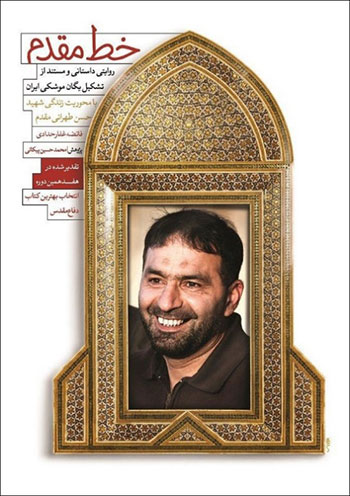
Aiming to collect memories and documents of the missile defense era, the first researches about this book, which is a narrative and documentary narration of the establishment of the Iranian missile unit, were conducted in 2005, focusing on the life of Shahid Tehrani Moghaddam. This book, which was published by the efforts of Faezeh Ghaffar Haddadi and researched by Mohammad Hossein Peykani, has been praised in the seventeenth period of choosing the best book of sacred defense. The book consists of interviews with Shahid Tehrani Moghaddam about his memoires during August 1984 to January 1987, in which, he has spoken more about his fellow martyrs than himself. He, in fact, was interested in recording the efforts of the anonymous fighters of the Missile Unit in history.
As mentioned in the introduction of the book, detailed interviews have been conducted with more than 50 people, and in some cases, to complete the content and to eliminate contradictions and ambiguities, interviews with some people have been repeated more than 20 times. The sixth edition of this 528-pages book, in trim size and with a price of 65,000 Tomans, has been recently published by Shahid Kazemi Press.
The Monuments
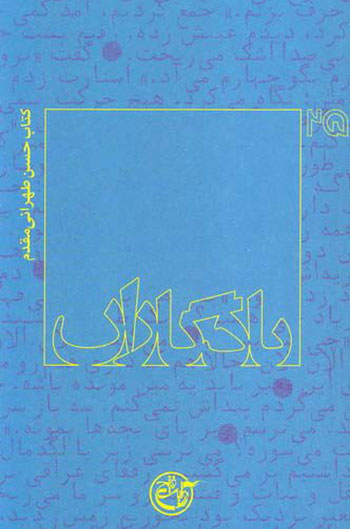
The Monuments is the title of a library, which consists of war photos in the form of rewritten memoirs for people who have not seen those years. The twenty-fifth book of this collection includes one hundred short memories of Shahid Hassan Tehrani Moghaddam based on narrations from his brother, wife, children and friends, was compiled by Farzaneh Mardi.
In part of the book it can be read, "The commander office and its desk and chair were not considered by him. Sometimes he would find a conex and start working there. Several important plans were developed in this way. His relationship with his forces was not like the commander-obedient. They were friends rather the boss-subordinate. That is why they did everything for him, all-out." (P. 41)
The book The Memorabilia: Shahid Tehrani Moghaddam has been published in 112-pages, in trim size, 2200 copies, and a price of 11000 Tomans, by Ravayat-e-Fatah Publications.
Fall of 1984
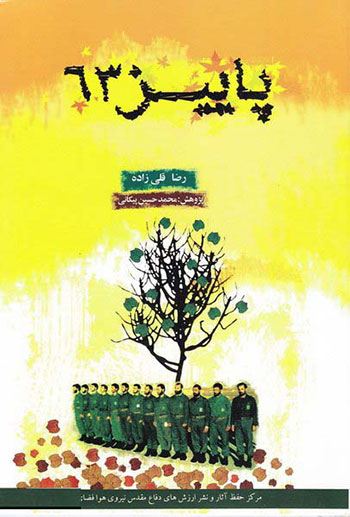
Fall of 1984 is a story about the epics and bravery of the unknown warriors of the IRGC Air Force, written by Reza Gholizadeh and researched by Mohammad Hossein Peykani which was published with attempts of the Society for the National Heritage of Iran, the Foundation for Preserving and Publishing Sacred Defense Works and Values of the IRGC Air Force, and District 11 Municipality. In this work, the memoirs of thirteen Iranians elite young, who went to Syria to learn missile science under the command of Hassan Tehrani Moghaddam can be read. The author has tried to combine and recreate some of the epics of the IRGC missile command with the memories of Shahid Tehrani Moghaddam and his fellow-warriors.
This book has been published by Niloufaran Publication in 166 pages and in trim size. According to the editor-in-chief of the publishing house, the book was first commissioned by Shahid Tehrani himself, and exactly on the day the book was published, there was an explosion and he was martyred, and unfortunately he could not see the book.
The Conqueror of Quds
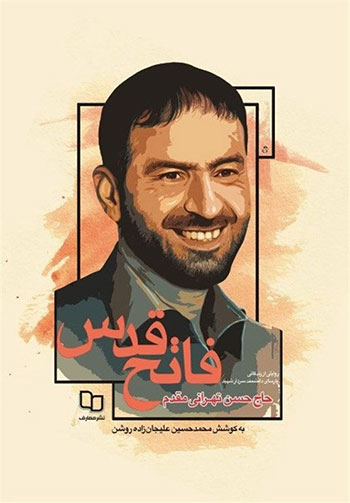
This book, which includes a narration of the life of ‘the father of Iran's missile’, was published by Maaref Publication with the efforts of Mohammad Hossein Alijanzadeh Roshan and looks the life of this great martyr from the view of his family (mother, wife, children, brothers), his colleagues and fellow-warriors, senior commanders of the IRGC, and some of the sports and cultural figures of our country.
The book contains seven chapters. In first chapter, the biography and chronology of the martyr's life are dealt with. At the next chapter the memoirs of his mother, wife, sister, brother and children are quoted. In the following, Sardar Tehrani Moghaddam is described from the perspective of his contemporaries and companions; and in the fourth chapter, the memories and words of Sardar Shahid are compiled. A report from foreign media after the martyrdom of Sardar Tehrani Moghaddam is presented in the fifth chapter; and then the names of the martyrs of the explosion of the IRGC Self-Sufficiency Research Center in Mallard Barracks and the martyrs of Ghadir are mentioned. Finally, a selection of condolence messages on the occasion of the martyrdom of this commander is given. Maaref Publishing has published the second edition of this work in 272 pages and at a price of 12,000 Tomans.
Empty-Handed
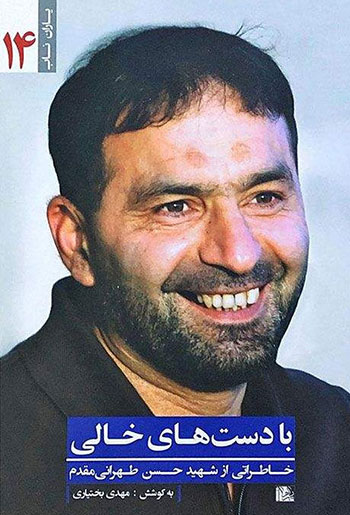
In this book, which was published by Ya-zhara Publications with attempts of Mehdi Bakhtiari in 30 chapters and 120 pages, memoirs of Mohsen Rafiqdoust, Mohammad Baqer Qalibaf, and Mohsen Rezaei, the wife and son of Shahid Tehrani Moghaddam, and some of his fellow-warriors have been quoted. Proper use of photographs and sometimes important orders and letters has made reading the book enjoyable and simple. One of the positive features of the book is that it depicts a complete but short image of the great martyr in the reader's mind. Many of the memoirs and historical information in this book are left unsaid or incomplete for security and political reasons; some people also expressed their statements on condition of anonymity, which has been referred to them as "protected". The book was released in 2015 in trim size and a price of 14,000 Tomans.
A Man with Long-range Dreams

This book, which deals with the life of Shahid Tehrani Moghaddam in the form of a memoir, was written by Faezeh Ghaffar Haddadi and published by Loh Negar Publishing House and contains the Shahid’s documentaries. In addition to the documentary biography of the Shahid, his political, social and struggle activities before the revolution as well as his activities after the revolution in the revolutionary committee, constructive jihad, and his active presence in the war and various operations of the imposed war were briefly recounted. Other parts of the book includes describing his moral values and God-pleasing goals, his bravery and courage, and his manner, as well as the presence of the Supreme Leader at his funeral. This book was published in 2012 with a price of 7500 Tomans in trim size.
Number of Visits: 5273








The latest
- An Eternal Lie!
- The 368th Night of Remembrance – Part 2
- Agents in Search for the Fighter
- The Embankment Wounded Shoulders – 13
- The Necessity of Standardizing Oral History and Criticism of General Mohsen Rezaei
- The 368th Night of Remembrance – Part 1
- Oral History News of Khordad 1404 (May 22nd – June 21st 2025)
- Najaf Headquarters Human Resources
Most visited
- Najaf Headquarters Human Resources
- Oral History News of Khordad 1404 (May 22nd – June 21st 2025)
- The Necessity of Standardizing Oral History and Criticism of General Mohsen Rezaei
- The 368th Night of Remembrance – Part 1
- The Embankment Wounded Shoulders – 13
- Agents in Search for the Fighter
- The 368th Night of Remembrance – Part 2
- An Eternal Lie!
Operation Beit al-Moqaddas and Liberation of Khorramshahr
After Operation Fat’h al-Mobin, we traveled to Kermanshah and visited Sar-e-Pol-e-Zahab before heading to Ilam. During Operation Beit al-Moqaddas, the 27th Brigade was still receiving support from the West. We maintained contact with individuals who had previously worked in Area 7 and were now leading the brigade. It was through these connections that I learned about Operation Beit al-Moqaddas.Memoirs of Hujjat al-Islam Reza Motalebi
Hujjat al-Islam Reza Motalebi is a cleric from Isfahan. Before the revolution, he was the imam of the Fallah Mosque – which was later renamed Abuzar Mosque. By his presence and efforts, Abuzar Mosque soon became a base for supporters of the Imam and the revolution. After the victory of the revolution, he played a role in uniting forces and maintaining political vitality in southwest Tehran.The Necessity of Receiving Feedback in Oral History
Whenever we engage in a task, we naturally seek ways to evaluate our performance — to correct shortcomings and enhance strengths. Such refinement is only possible through the feedback we receive from others. Consider, for instance, a basketball player whose shots are consistently accurate; should he begin shooting blindfolded, his success rate would rapidly decline, as he would be deprived of essential feedback from each attempt.Sir Saeed
The book “Sir Saeed” is a documentary [narrative] of the life of martyr Seyyed Mohammad Saeed Jafari, written by Mohammad Mehdi Hemmati and published by Rahiyar Publications. In March 2024, this book was recognized as one of the selected documentary biographies in the 21st edition of the Sacred Defense Book of the Year Award. The following text is a review on the mentioned book.

